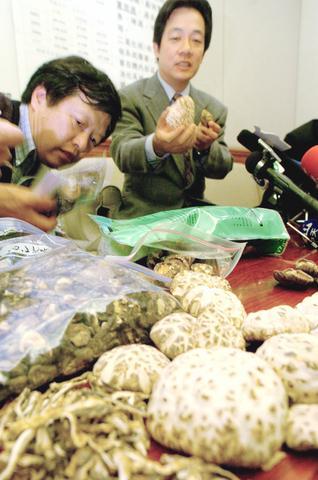Nearly 300 tonnes of dry oak mushrooms grown in China have been imported from a third country in the last three years, and health authorities should tackle the health risk, a legislator said yesterday.
Democratic Progressive Party Legislator Lai Ching-te (賴清德) yesterday released customs records of imported dried mushrooms from 2002 to this year, saying they were inconsistent with those of exporters.

PHOTO: SEAN CHAO, TAIPEI TIMES
In the last three years, customs documents show that the nation has imported 252 tonnes of dry mushrooms from Japan, but records there indicate only 15 tonnes were exported. Similarly, during this period of time, Taiwan imported 64 tonnes of the mushroom from South Korea, but export records there only account for 18 tonnes.
"We suspect that Chinese oak mushrooms make up the gaps. Ironically, we don't see health authorities actively checking these goods, which are easily available on the market and might jeopardize consumers' health," Lai said.
Lai said lax regulations in China made the quality of Chinese agricultural products inferior to other countries. He also added that two years ago, Japan detected residues of toxic dichlorvos at levels 28 times higher than what is acceptable on produce imported from China.
China's food safety regulations are far lower than those of its neighbors. Farmers there are permitted to use preservatives such as formaldehyde.
In addition, Singapore and Hong Kong also reported exceedingly high levels of heavy metals and pesticides in mushrooms imported from China, Lai said.
Lai also said Chinese farmers often add sulfur dioxide or formaldehyde to keep mushrooms pleasing to the eye, but these chemicals pose a threat to human health.
Responding to Lai's claims, officials at the Department of Health said regular examinations of imported items are carried out by the Bureau of Standards, Metrology and Inspection under the Ministry of Economic Affairs.
According to Hsiao Tung-ming (蕭東銘), deputy director of the department's Bureau of Food Safety, in recent years, the government has not found levels of chemicals exceeding national standards in imported dry mushrooms.
"Consumers should be confident of governmental practices in ensuring food safety," Hsiao told the Taipei Times.
Hsiao also said that if agricultural goods failed to meet the nation's food safety regulations, more comprehensive checks are conducted.
In related developments, local mushroom farmers who face competition from imported mushrooms urged the government to protect their livelihoods.
"We are afraid that suspicious Chinese mushrooms coming into Taiwan can beat local products due to their unbelievably low prices," said Chen Tsung-ming (陳宗明), director-general of the Taiwan Mushroom Research and Development Association.
According to Chen, the price of high quality Korean mushrooms declared at customs in Taiwan is only 13 percent of what it costs in South Korea.
Taiwanese mushrooms cost NT$750 per kilogram, but Japanese mushrooms only cost NT$320 per kilogram.

Taiwan is stepping up plans to create self-sufficient supply chains for combat drones and increase foreign orders from the US to counter China’s numerical superiority, a defense official said on Saturday. Commenting on condition of anonymity, the official said the nation’s armed forces are in agreement with US Admiral Samuel Paparo’s assessment that Taiwan’s military must be prepared to turn the nation’s waters into a “hellscape” for the Chinese People’s Liberation Army (PLA). Paparo, the commander of the US Indo-Pacific Command, reiterated the concept during a Congressional hearing in Washington on Wednesday. He first coined the term in a security conference last

Prosecutors today declined to say who was questioned regarding alleged forgery on petitions to recall Democratic Progressive Party (DPP) legislators, after Chinese-language media earlier reported that members of the Chinese Nationalist Party (KMT) Youth League were brought in for questioning. The Ministry of Justice Investigation Bureau confirmed that two people had been questioned, but did not disclose any further information about the ongoing investigation. KMT Youth League members Lee Hsiao-liang (李孝亮) and Liu Szu-yin (劉思吟) — who are leading the effort to recall DPP caucus chief executive Rosalia Wu (吳思瑤) and Legislator Wu Pei-yi (吳沛憶) — both posted on Facebook saying: “I

The Ministry of Economic Affairs has fined Taobao NT$1.2 million (US$36,912) for advertisements that exceed its approved business scope, requiring the Chinese e-commerce platform to make corrections in the first half of this year or its license may be revoked. Lawmakers have called for stricter enforcement of Chinese e-commerce platforms and measures to prevent China from laundering its goods through Taiwan in response to US President Donald Trump’s heavy tariffs on China. The Legislative Yuan’s Finance Committee met today to discuss policies to prevent China from dumping goods in Taiwan, inviting government agencies to report. Democratic Progressive Party Legislator Kuo Kuo-wen (郭國文) said

Sung Chien-liang (宋建樑), who led efforts to recall Democratic Progressive Party (DPP) Legislator Lee Kun-cheng (李坤城), was released on bail of NT$80,000 today amid outcry over his decision to wear a Nazi armband to questioning the night before. Sung arrived at the New Taipei District Prosecutors’ Office for questioning in a recall petition forgery case last night wearing a red armband bearing a swastika, carrying a copy of Adolf Hitler’s Mein Kampf and giving a Nazi salute. Sung left the building at 1:15am without the armband and covering the book with his coat. Lee said today that this is a serious